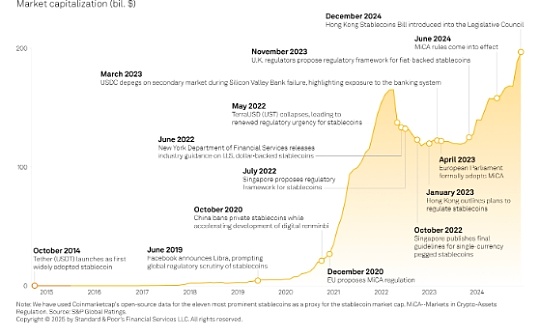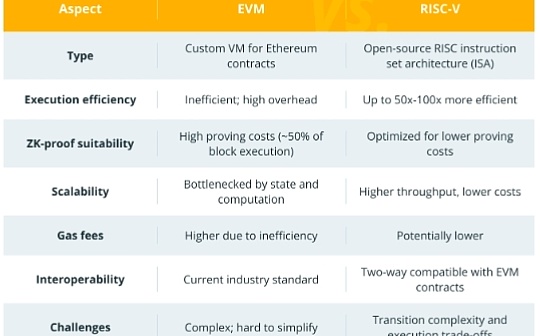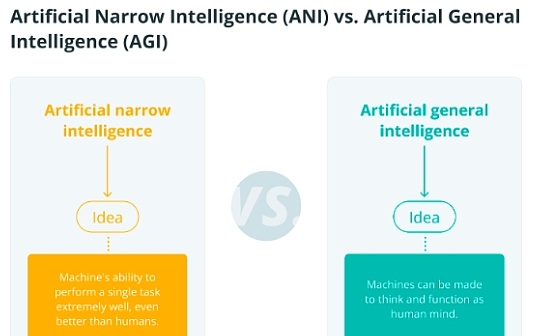
Author: Jules Winnfield, CoinTelegraph; Compilation: Wuzhu, Bitchain Vision
1. What is AGI?
When the boundaries between humans and machines become blurred, we see universal artificial intelligence (AGI).Unlike narrow-minded artificial intelligence (ANI) (which uses artificial intelligence to solve a single problem), AGI refers to artificial intelligence that can understand, learn, and apply knowledge in ways that are indistinguishable from human cognition.
AGI is still in the theoretical stage, but the prospect of artificial intelligence being able to replace human input and judgment in an all-round way naturally attracts widespread attention, with researchers, technologists and scholars working to turn the concept of AGI into reality.
Currently, another mainstream study seeks to explore the feasibility and impact of AGI and ANI in a world increasingly affected by artificial intelligence.
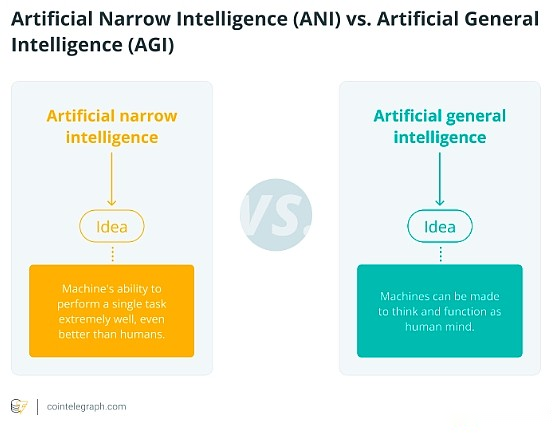
In fact, while ANI has transformed all walks of life, AGI’s potential is much more than that.Imagine a world where a machine not only assists humans in completing tasks, but also actively understands the drivers behind a specific task, predicts results, and independently creates innovative solutions to achieve the best results.This paradigm shift could revolutionize health care, education, transportation, and countless other areas.
2. Why is AGI so powerful?
Unlike ANI, AGI is not limited to performing pre-programmed tasks or pre-defined responses within a limited domain.Instead, it has the potential to generate and apply knowledge in a variety of contexts.
Imagine an AGI-powered self-driving car.Not only can it pick up passengers from the train station, it can also personalize your journey and finally reach your destination by customizing suggestions such as stopping at the train station, choosing a sightseeing route or navigating strange roads.And, because AGI is a machine, it does not feel tired and is able to continuously learn and improve at an exponential rate.
Vitalik Buterin gave the following definition of AGI, and he emphasized the great potential of AGI:
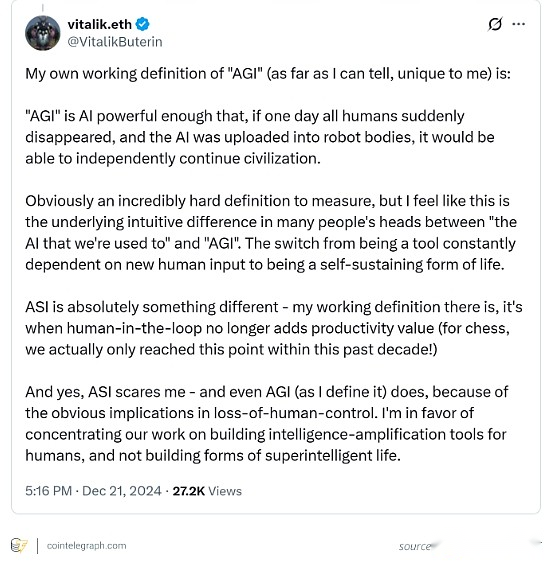
This example highlights some interesting features of AGI, including:
-
Learning Ability:AGI can learn from experience and continuously improve its performance over time without the need for additional dataset training by human programmers.This learning is not limited to specific tasks, but covers a wide range of activities.
-
Problem-solving ability:AGI can use logical reasoning to solve complex problems like humans.This includes considering non-traditional variables, such as emotional impact, which can reveal a broader potential outcome.
-
Adaptability:AGI adapts to new situations and environments without explicit programming, which means it can thrive in dynamic and unpredictable environments.
-
Understanding and explanation:AGI can understand natural language, abstract concepts, and emotional nuances, enabling complex human-computer interactions.
3. AGI’s pursuit: Where will it be in as of April 2025?
AGI is currently a science fiction version of AI.However, while AGI is still in its theoretical stage, its huge potential makes it a science fiction version of artificial intelligence.
While existing models such as ChatGPT are constantly evolving and improving, the journey to turn AGI into reality still requires overcoming significant technical challenges such as:
-
Defining the technology stack:The purely hypothetical nature of general artificial intelligence (AGI) makes it difficult (or even impossible) to determine the exact nature of the technology stack required for actual implementation.
-
Neural Network:Advances in deep learning have driven this field, but AGI also requires specialized neural networks to simulate human brain structures to process information and introduce emotions and nuances.
-
Natural Language Processing (NLP):The NLP field needs to make significant progress to enable machines to better understand and generate human language and incorporate nuances, emotions and complexity.This includes more complex analysis of language grammar, semantics, and context, which is still evolving in traditional machine learning models leveraging NLP.
-
Reinforcement learning:Using reward-based mechanisms to train machines for decision making will enable AGI to learn best behavior through trial and error.
Despite the progress, creating AGIs that can truly think like humans is still a difficult goal.
4. Can AGI think like humans?
Whether general artificial intelligence can think like humans is an in-depth look at the core of human cognition.Human thinking is characterized by consciousness, emotional depth, creativity and subjectivity.While general artificial intelligence can simulate certain aspects of human thinking, copying the full scope of human cognition is a daunting challenge.
Several dimensions of human cognition are particularly difficult to imitate:
-
Consciousness and self-cognition:One of the distinctive features of human thinking is consciousness, that is, the perception of oneself and its surroundings.No matter how complex general artificial intelligence (AGI) lacks the introspective ability of human beings.AGI operates on a set of underlying algorithms and complex learning patterns, lacking subjectivity or real emotion.
-
Emotional intelligence:Humans experience a variety of emotions that affect their decisions, behaviors, and interactions.While AGI can recognize and respond to these emotions through training, the lack of a true emotional experience means it cannot fully replicate these emotions.Human emotional intelligence involves empathy, compassion, and moral considerations, and these elements are difficult to encode by machines.
-
Creativity and Innovation:Creativity involves the generation of novel ideas and solutions, often achieved through intuitive leaps and imaginative thinking.AGI can mimic creativity by combining existing knowledge in new ways, but it lacks the inherent motivation and subjective insight that drives human innovation.True creativity stems from emotional experiences, personal reflections, and cultural contexts that AGI cannot truly replicate.
5. The main advantages of AGI
The touchstone of general artificial intelligence lies in whether it can fully replicate human experience.Once realized, its potential benefits will be extremely huge and will benefit all walks of life and affect all aspects of daily life.
Despite the limitations of general AI, it is increasingly viewed as a positive force in all walks of life, including:
-
Healthcare:AGI can use massive basic training data to assist in diagnosing diseases, formulating personalized treatment plans, and predicting personalized health outcomes.
-
educate:AGI can provide customized learning experiences, tutoring and academic research support.AGI can adapt to personal learning style and learning progress, thereby improving educational outcomes.
-
economics:AGI can optimize financial models, predict market trends and increase productivity.It can analyze economic data, predict market trends and guide investment decisions.
-
Environmental Science:AGI can analyze climate data, simulate ecological impacts and propose sustainable solutions.
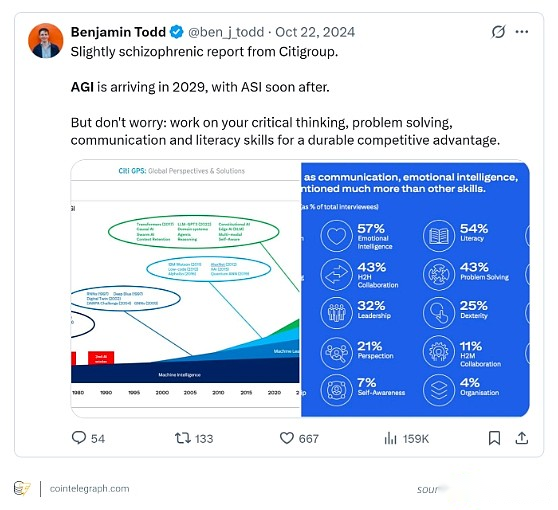
In addition, the potential of AGI extends to areas such as transportation, communications and entertainment, providing new frontiers for innovation.
VI. Ethical and Social Considerations
The rise of AGI has caused significant ethical and social issues.
Although AGI is powerful, its safe use still needs to be carefully considered, which has led to the establishment of some non-profit associations, such as the AGI association shown in the figure below.
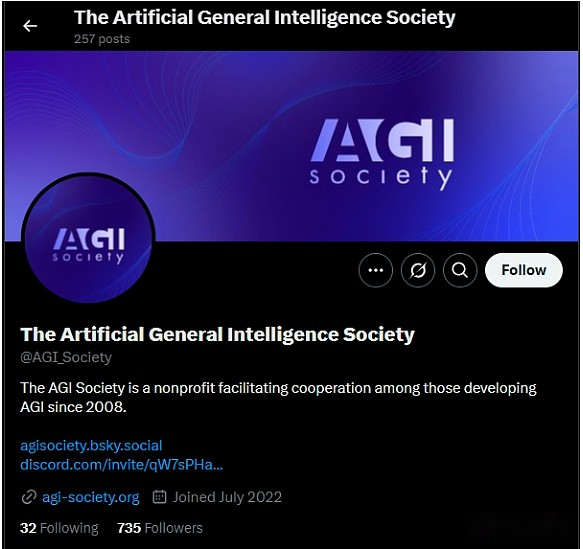
Fundamentally, it is crucial to solve the following problems:
-
Safety:Ensure that universal artificial intelligence (AGI) operates within a safe and controllable parameter range to prevent unintended consequences.This includes conducting rigorous testing and introducing regulatory frameworks to oversee the deployment of AGIs.
-
privacy:Protect personal data from abuse by AGI systems.Since AGI can handle massive amounts of data, it is crucial to protect privacy.
-
Prejudice and fairness:Prevent discriminatory practices and ensure fair access to AGI benefits.Developers must ensure that there is no bias in the AGI system that can lead to unfair treatment.
-
Employment:Respond to the impact of AGI on job loss and labor dynamics.As AGI automates tasks, it is necessary to consider its impact on employment and provide support to affected workers.
AGI integration into society requires a thoughtful governance approach that ensures it serves the public interest and respects social values.
7. Can blockchain power AGI?
General artificial intelligence (AGI) can create computers as smart as humans, revolutionizing areas such as cryptocurrency trading or market analysis.But AGI needs trust and fairness to benefit everyone.The technology behind Bitcoin and Ethereum, blockchain, provides a secure and transparent way to achieve this.
Here is how blockchain can leverage crypto-inspired solutions to enhance AGI performance:
-
Clear training records:Blockchain works similar to Bitcoin’s open transaction logs, recording every piece of data used to train general artificial intelligence (AGI) (e.g., cryptocurrency trading mode).This helps ensure that the system is fair and just, without any hidden bias.
-
Shared decisions:Similar to Ethereum’s smart contracts, blockchain will allow developers, traders and users to vote on AGI rules, ensuring that no company can control it.
-
Secure data sharing:Just like crypto wallets protect funds, blockchains can protect sensitive data from cryptocurrency exchanges, enabling secure sharing of AGI training and avoiding data breaches.
-
Fair Reward:Developers who build impartial AGIs (such as accurate transaction predictors) can earn digital tokens, just like cryptocurrency mining rewards, thus encouraging ethical work.
However, persistent challenges such as slow blockchain speeds, latency in crypto transactions, and limited storage capacity may make it difficult for general-purpose artificial intelligence (AGI) to process data quickly or process large data sets.
To enable blockchain to prepare for general artificial intelligence (AGI), researchers are already exploring:
-
Off-chain storage:Decentralized systems like Interstellar File System (IPFS) are used to store large files off-chain, while blockchains only hold verifiable hashes, reducing congestion.
-
Sharding and danksharding:Similar to Ethereum’s scalability upgrade, shards split data across multiple nodes, allowing general-purpose artificial intelligence (AGI) to process more information without slowing down the network.Additionally, a high-level sharding form being developed for Ethereum, danksharding combines rollup and data availability sampling, which can efficiently scale data access, making it ideal for real-time general-purpose artificial intelligence (AGI) applications.
-
Data trimming:Advanced blockchain models like the blockchain-based decentralized artificial intelligence computing network (DAIBCN) prune old or unrelated data, keep the system streamlined and optimized for high-demand tasks such as general artificial intelligence (AGI).DAIBCN also supports secure distributed artificial intelligence (AI) computing, perfectly integrating blockchain trust with artificial intelligence (AI) performance.
8. The future of AGI
General artificial intelligence represents the pinnacle of the development of artificial intelligence and is expected to achieve capabilities comparable to human intelligence.
While general artificial intelligence (AGI) can simulate certain aspects of human thinking, achieving truly human-like cognition is still a distant goal.Consciousness, emotional depth and creativity are inherent attributes of human experience and pose a major challenge to general artificial intelligence.
Nevertheless, the pursuit of general artificial intelligence continues to drive innovation and reshape our understanding of intelligence.As we move to this frontier, ethical considerations and social implications must be taken into account to responsibly leverage the potential of universal AI.
Continuous research, identifying practical opportunities and technical requirements, and conducting dialogues across the society are key steps in addressing the challenges and opportunities brought by general artificial intelligence.
The future of universal AI is promising, but it requires a balanced approach to ensure that its ultimate integration into society can enhance human well-being and respect ethical standards.

